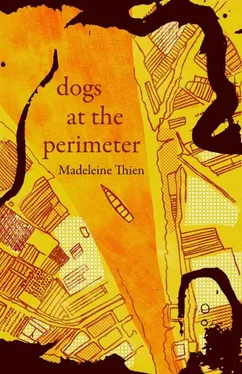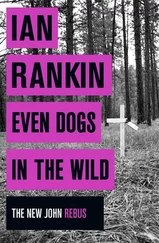We took turns lying down, first my brother and I, then the man, who told us to call him Meng. Above us, slats of wood had been removed and we could see up into the sky.
My last image of Cambodia was of darkness, it was the sound of nearly forty mute wanderers, of silent prayers. I closed my eyes. My father told me how Hanuman had crossed the ocean, how he had gone into another life. Look back, my mother said, one last time. I followed her through our twilit apartment, walked in the shade of my father, past bare walls and open windows, the noise of the street pouring in. Between us, she said, I had known love, I had lived a childhood that might sustain me. I remembered beauty. Long ago, it had not seemed necessary to note its presence, to memorize it, to set the dogs out at the perimeter. I felt her in the persistent drumming of water against the boat’s hull. Guard the ones you love, she told me. Carry us with you into the next life.
Exhausted, holding tight to my brother, we set out across the sea.
Our time in the boat was infinite. One long night that battered on and on until the food was gone and the water drained away. Meng, ever watchful, would take my hands. Gently, he would massage my fingers and my cupped palms, telling me that soon, any day now, we would arrive.
He showed us a photo of a smiling man in an oversized floral shirt and dark slacks. This was his younger brother, Sann. They had hidden in the caves together and then his brother had gone ahead with his wife and sons, using the same smugglers, arriving finally off the coast of Malaysia. The smugglers had given Meng this photograph. “To reassure me,” Meng said, “and to raise the price.”
“Do you come from the city?” I asked him, trying to see Phnom Penh, to hold it once more in my mind’s eye.
“I was born there,” he said. “But I lived many lives. Teacher, farmer, soldier.”
“Khmer Rouge?”
He nodded. After a moment, he said, “Your father, what work did he do?”
“He was a translator. Angkar took him away.” I didn’t know how to continue. Hearing the words, I felt defenceless, ashamed. Meng lowered his eyes. Even here, in the crowded boat, he tried to shelter us, to give us space to breathe.
I curled on my side and watched my brother sleep. All the time he asked for water. “There is the tap,” he said, half-dreaming. “But look, nothing comes out. I twisted it all the way around but there’s no water, no water anywhere.”
That morning, Meng paid the fishermen and they let us up into the open air. Sopham and I climbed out of the hold, clinging to the sides of the boat. We were impossibly small. The waves crowded against our ears, muting our thoughts. All was blue, all was noise.
“I saw so many things,” Sopham told me. “One day, I promise, I’ll find a way to tell you everything.”
On the sea, we moved through a turbulent world, forever adrift. Three or four nights passed, but each day, no land appeared on the horizon. On and on we went until the night when the men came. The collision hit like an explosion. Once, these men had been fishermen, but now they were something else, some instinct that has no pity, no name. They robbed us, and then they forced the girls up out of the cargo hold. I remember the sound of crying, a noise like a serrated edge. Minutes passed, hours. I remember crawling between the bodies to the edge of the deck, away from the smell of fuel, but still the men were there. Pulling us back, taunting us. Time stopped. I have no words for what was done. Sopham appeared and we fell into the sea. I fell, I kept falling, and then my body rose to the surface. Still they were behind me, holding me, crossing oceans and continents. Coming into every room, every place, preceding me into my life. I no longer wanted to breathe the air. My brother kept repeating my name. He used his krama to tie my wrist to a piece of floating wood, checking and rechecking the knot. Don’t leave me, I said. The boat withered and dark shapes bent across the water. I tasted salt, dreamed salt. Morning came and it seemed that we were caught on broken glass, countless fragments that turned the light aside. My brother said the guard had gone to sleep, he could go past, he could leave without her waking. I told him that our wandering was over, we had nothing more to be afraid of. The key was gone. I said that I could not bear to be alone. My brother wept. I was not strong enough to hold him. He opened his hands and I watched as the ocean breathed him in.
I saw my wrist and my hand bound to the wood but I no longer recognized it as my own. The knot my brother had tied would not come loose. Inside me, all the feeling went away.

I can taste the faint, distilled light, it rests on my tongue like a coin. I am nearly at the edge of the city. The road gives way to open space, untrodden snow. The northern reach of Boulevard St-Laurent comes to an end and I stand at last at the river. Behind me, trees tower up into the pale sky.
On a park bench, a woman wearing ski gloves is carving letters into the wood. I can hear the hard edges of her blade, like an animal burrowing into the frozen ground. I remember how, in the ocean, the water had become a shining mirror, how the sun had touched everything and left no shade, no chasms. The fishermen who drew me from the water hurried across the sea until, finally, their boat reached land. I remember the sudden, incomprehensible, stillness. One of the men lifted me from the boat and I looked up and saw the high palms, the amber sky. The man who carried me began speaking, words that rustled together, and then I was passed into another person’s arms. They brought me into a house where I was laid down and washed and covered.
Something has turned over in me, broken and come undone. I take my phone and begin dialling Meng’s number. He picks up on the first ring. When he hears my voice, he shouts in joyful surprise. “It’s Mei,” he says to someone, to us both. “It’s Mei!”
Voices rattle behind him. Grandchildren, he tells me, laughing proudly when I ask. “ Mes petits canards ,” he calls them. One by one, they come to the phone and greet me in high-pitched voices, then my friend returns.
“Meng,” I say finally. “On the boat that night, did you hear them coming?”
In all these years we’ve stayed in touch, I’ve never been able to talk about what happened. He, too, had been pulled from the water and saved. He asks me where I am. I tell him I am at the river, I have walked as far as I can away from the city, I cannot find a way to go any farther.
“No,” he says. His voice is quiet. “I didn’t hear them. Until the very last moment. I never heard them.”
I want to tell Meng that I know too much, I have too many selves and they no longer fit together. I need to know how it is possible to be strong enough. How can a person ever learn to be brave?
“Janie,” he says. “My child.” He says that my parents, my brother, lived their lives. “They wouldn’t want you to fight on and on. To fight even when it’s done.” Long ago, Meng and I had stood together at the water’s edge. “Your daughter is leaving now,” he had said, addressing my ghosts. “Your sister has found a new home. You, too, must walk to your own destiny.” The incense in my hands had left its smoke in the air. The next day I would depart for Canada.
“We have to try again,” he says. “Not just once but many times, throughout our lives.”
I feel as if I am swaying over the river, but that this river, finally, is blind to me. I can see it now for what it is, only a membrane, a way down. Leave me , I think. Let me go.
Читать дальше













